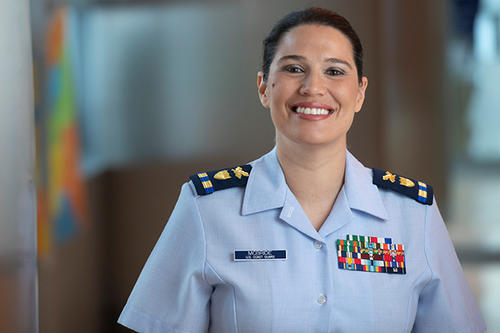
Terri McBride grew up in San Antonio, but she always dreamed of traveling the world. So in 1999, after joining the U.S. Coast Guard as an active-duty member, she was excited to accept a post as a boat crewman and watchstander on Long Island.
“It was a hard job,” McBride recalls. “We cleaned the boats. We sanded and painted the boats. Our 24-hour watch days alternated with 9-to-5 workdays.”
In 2009, McBride left active duty and began work on a bachelor’s degree at San Jose State University. (She was the first in her family to attend college.) McBride changed her major to biology and was recruited into two programs that offered students from minority backgrounds research experience and mentoring.
At a science conference, a poster she presented caught the attention of Casey Dorr, an assistant professor in the U of M Medical School and a researcher at Hennepin Healthcare Research Institute. That connection ultimately brought McBride to Minnesota for medical school, and she’s now in her third year.
McBride still serves in the Coast Guard reserves as a finance and supply chief warrant officer. She is considering a career in forensic psychiatry—a path that often involves working in the legal system with people who have mental illnesses and with other underserved populations.
“I’ve always wanted to serve the underserved because of my background,” she says. “I have a natural empathy toward what some people may consider ‘hopeless’ patients due to their lack of medical compliance and self-harming behaviors, because I have experienced the same frustrations with many of my family members.
“Looking back, I can see that when people in our family or neighborhood got sick, they didn’t get top-notch care because of our financial status. I want to serve those people.”
- Categories:
- Science and Technology





